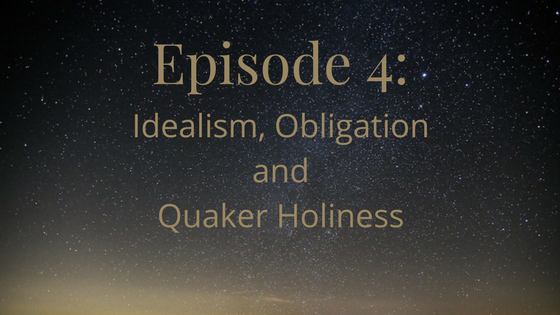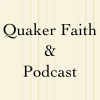Idealism, Obligation, and Quaker Holiness

Section 1D of Traditional Quaker Christianity looks at idealism, obligation, and Quaker holiness. Uh oh, we’re going to use a word some Quakers tend to avoid: sin.
Idealism & Obligation
Lewis Benson, in his “Catholic Quakerism,” defines an ethic of idealism and an ethic of obligation. He asserts that Quakers, from the early days, adhere to an ethic of obligation: we do things because they are required of us, not because we think they will add up to some version of Utopia. This is the same ethic involved in many other religions. Why do Jews keep kosher? God says to. Why do Muslims pray toward Mecca? God says to.
Yet, for some reason, many Quakers, when asked “why?” respond with a secular justification for what they’re doing. I (Mackenzie) am certainly guilty of that when put on the spot with someone asking why I wear Plain dress and cover my hair. Often I’ll instead answer how I arrived at the particulars (why these shirts?) and avoid the overarching question. Maybe I’ll give a still-spiritual answer about vanity, pride, spending less of my time on hair & wardrobe. It’s uncomfortable to answer “I think God wants me to.”
And if you’re not into God language, sometimes you’ll hear other ways of saying it:
- I’m being led to…
- the Universe is telling me to…
- I felt called to…
As part of that, Benson says we have the ability to do everything that is required of us. Thus, we shouldn’t make excuses for disobedience, falling short, or sin. On the one hand, that’s pretty empowering! On the other hand, that can be intimidating.
Quaker Holiness
This gets complicated. We are, all of us, complicit in the ways of our world. We can’t really avoid all products with unethical production or distribution in a complex global economy. John Woolman went to great lengths, as “the original conscious consumer,” to avoid things made by slaves. But now, finding out the origin of any consumer goods is nearly impossible. Brands contract and subcontract and production of their goods until figuring out which factory made what is nearly impossible. Are we all sinning by wearing clothes, wherever we got them? If so, does that mean Quaker holiness is a lie?
This goes back to the “measure of the Light” discussed in episode 3. Jesus had different expectations for different people in the Bible. For example, salvation comes to Zacchaeus, who repays what he’s taken several times over and gives half his wealth to the poor. Meanwhile, Jesus orders the rich young man to give all he has to the poor. So maybe we are being commanded to deal with the sin of the world in a different way. Maybe instead, we try to more directly change working and environmental conditions. In timely Internet fashion, an article made the rounds just last week about the limits of conscious consumerism. Discerning a leading is up to the individual, with support from their community.
What do you think? What does it mean for holiness to be an “indispensable obligation”? Can it be indispensable, an obligation, and still there’s room for screw-ups and grace?
References
- Catholic Quakerism by Lewis Benson
- Jesus Christ Forbids War by John Edminster
- The Validity of the Christian Mission by D. Elton Trueblood
- Journal of John Woolman
- Matthew 19:16-30
- Luke 19:1-10
Podcast: Play in new window | Download
Subscribe: Apple Podcasts | Email | RSS
